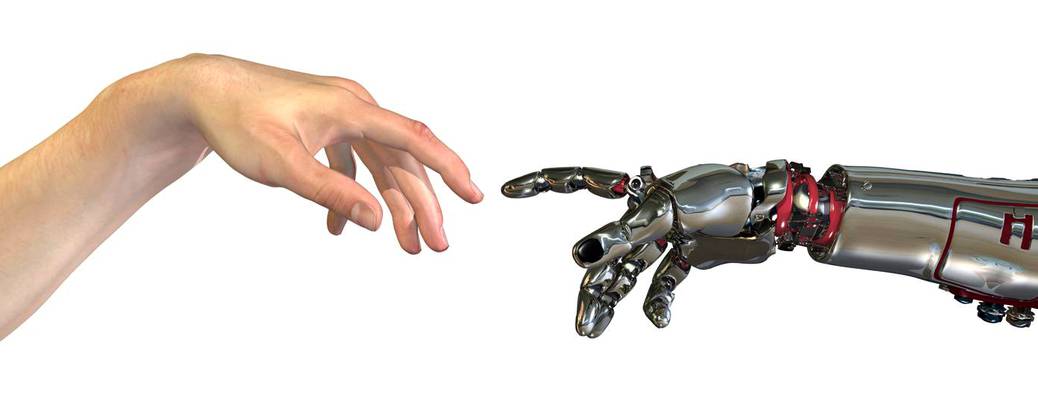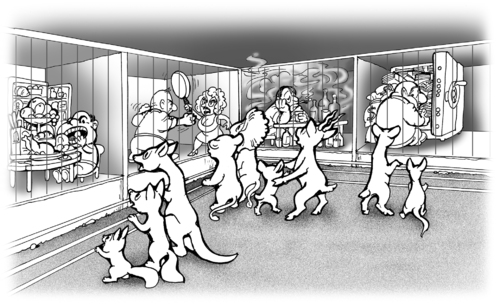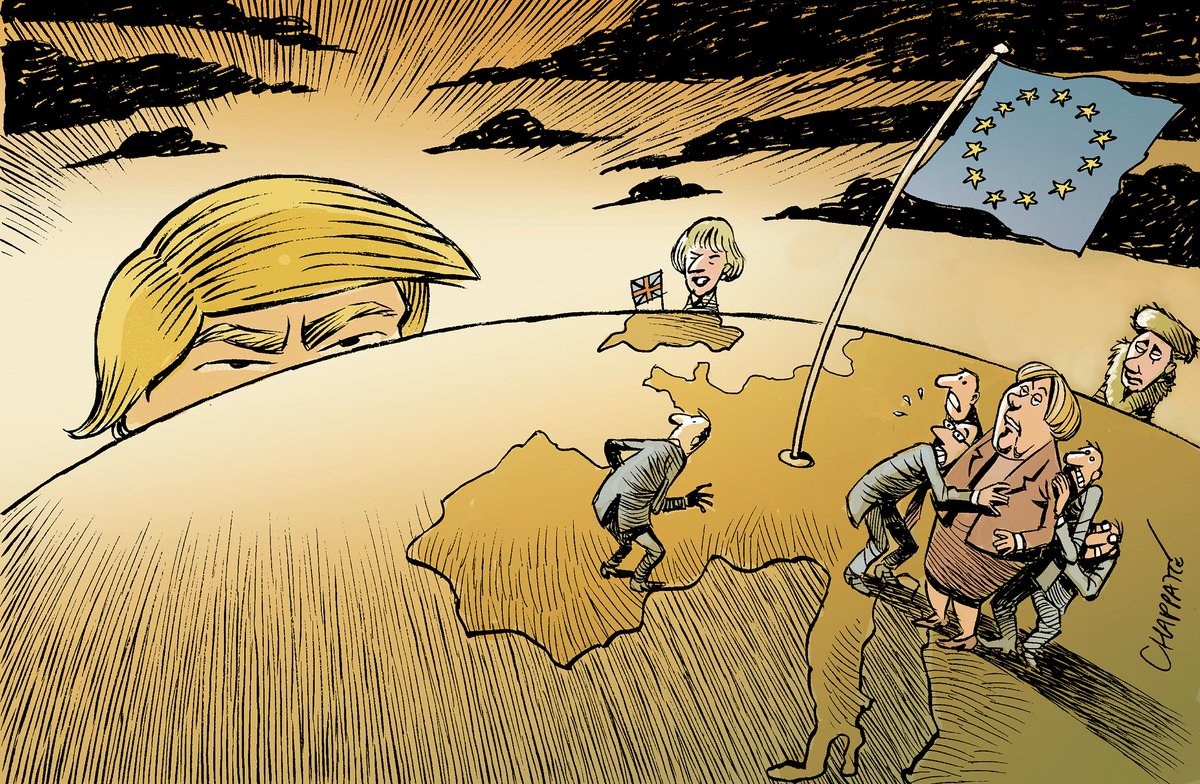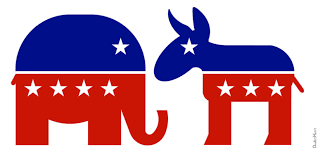Rob's Flash Messages
Rob's Stories
New leadership
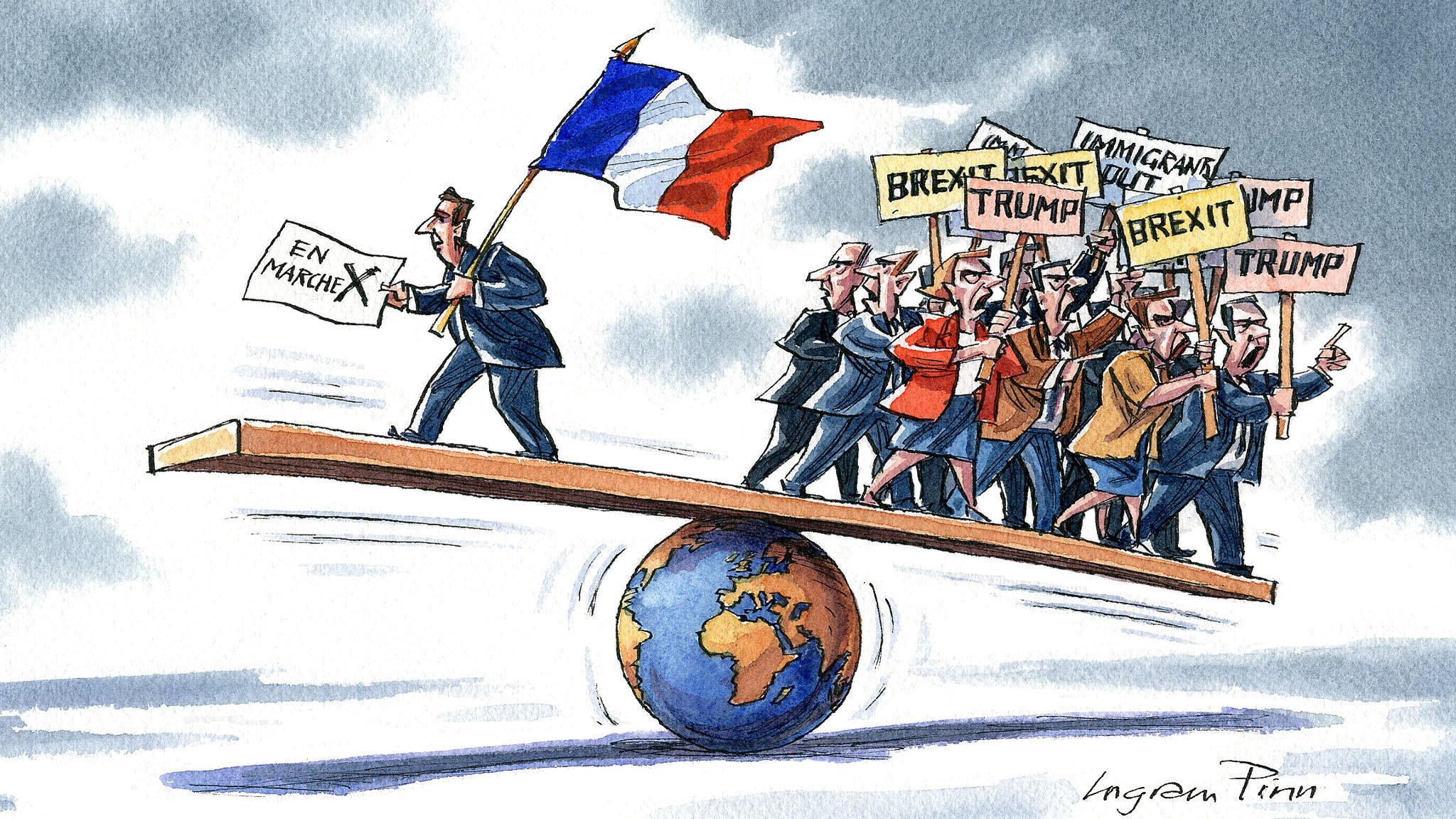 With Brexit and Trump as the US president, countries like the UK and US have obviously chosen to go their own way. They don't want the consequences of globalization: free movement of goods, capital, services and people and most importantly like in case of the US, commit to global agreements like the Paris Accord. Instead, they want to make their "countries great again" whatever the consequences are for the rest of the world. Well, they believe that their greatness is automatically beneficial for the rest of the world.
With Brexit and Trump as the US president, countries like the UK and US have obviously chosen to go their own way. They don't want the consequences of globalization: free movement of goods, capital, services and people and most importantly like in case of the US, commit to global agreements like the Paris Accord. Instead, they want to make their "countries great again" whatever the consequences are for the rest of the world. Well, they believe that their greatness is automatically beneficial for the rest of the world.
At this very moment, the "rest of the world" does not agree. Leadership of Theresa May and Donald Trump in- and outside of their own countries is challenged by "the rest of the world" with awesome examples of Emmanuel Macron and Angela Merkel. May and Trump have shred the prime leadership positions of their countries in just a few months after hundreds of years of dominance and they will never get it back in this new world order with a strengthening EU, China, India and a few others. How foolish can anyone be?
Democracy is a high good. People from a country can vote for a leader or in a referendum demand a certain policy. The rest of the world can't vote for it which is OK by itself. After all, the people of the said countries build their own environments and therefore their own democracies. It would be a mess when people from all over can vote anywhere.
However, those people (from the rest of the world) would still have to live with these globalization-fobic countries. Fortunately there is a simple solution: if you can't vote in a booth, you can still vote with your wallet. It's exactly the same as the sanctions countries punish other countries with. Only on a personal scale. The concept of "Buy American" can be easily reversed.
Personally I already had a shortlist of countries I tried to avoid. Not going on vacation to them, avoid buying their goods or services, avoid advertising their qualities. On my list far far away countries like North Korea, Syria and South Sudan do not do much harm, either way. I would not know any product I would like to buy from them and I certainly would not go there anyway. Russia and Suriname are already a bit more difficult. Should I not buy Russian vodka anymore? Start to ignore my friends and colleagues from Suriname?
Now the UK and the US not only are moving away from my personal "good world" vision but more explicitly, ruining my pension savings severely, ruining the ecological future for the planet, ruining the ideals i've been standing for all my life, it gets more nasty. Maybe it's time to stop admiring Apple iPhones, using Amazon and Google services, watching BBC and Netflix, shopping in London or New York, playing golf in Scotland, buying Levi's, Coca Cola, Ford, Jaguar or even fuel from Exxon for my car. Instead of a blacklist I at least can have a whitelist of countries where I would spend my money preferably: Netherlands, Spain, Germany, France, India, China, Japan and a few more. Not that they are perfect but at least they don't insult my ideals that much or harm me personally.
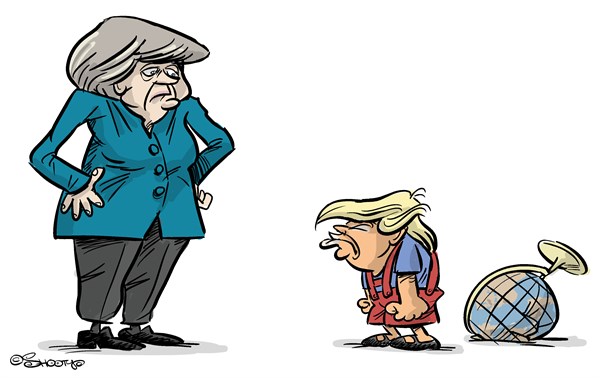 I was wondering by myself, is this disappointment, bitterness, revenge? Not really. Brexit and Trump just opened my eyes that this world obviously still is too complex too have equal multi-lateral cooperation between large economic and military powers with too big ego's. Although I do believe that we should never stop putting in energy in multi-lateral unity, for the time being "focus" is the key-word. Focus on simplicity, strength and growth. Smaller countries (say smaller than 250 MIO people or a GDP less than 2.000 B$) are irrelevant in this game and better unite with others. It's like the old G5, G7, G10, G20 or whatever Gxx from the "old ages" still try to show their leadership and willingness to cooperate. Unfortunately these G's are all history because they hang on to the old "world leadership positions" instead of what is actual today.
I was wondering by myself, is this disappointment, bitterness, revenge? Not really. Brexit and Trump just opened my eyes that this world obviously still is too complex too have equal multi-lateral cooperation between large economic and military powers with too big ego's. Although I do believe that we should never stop putting in energy in multi-lateral unity, for the time being "focus" is the key-word. Focus on simplicity, strength and growth. Smaller countries (say smaller than 250 MIO people or a GDP less than 2.000 B$) are irrelevant in this game and better unite with others. It's like the old G5, G7, G10, G20 or whatever Gxx from the "old ages" still try to show their leadership and willingness to cooperate. Unfortunately these G's are all history because they hang on to the old "world leadership positions" instead of what is actual today.
I suggest a maximum of 10 conglomerates in which every country has its place. Those who do not want to join one of the 10 conglomerates, give up their votes in the global play. This new BIG-10 replaces the security council too. If there are changes in power (= volume in GDP), the BIG-10 changes too accordingly. No more fuzz with smaller countries without significant power. "Participation" is the key-word for them as focus was for the conglomerates. It will hurt the smaller ego's a bit but that's the price for "great together" as opposed to "small alone".
So to the EU I would say: Stop the hassle and let's make Europe (finally) great (again). Forget NATO, TTIP and more. Go your own way, create a "Make and Buy European" culture (which does not mean to close down all other business relationships), invest in security in all levels and stop relying on the UN/US/UK, create a strong if not avoidable even federal coalition. Borders in Europe have changed in the last 200 years frequently and more often than anywhere in the world! So what's the point? Unite, invest, protect, forget the differences and focus on the strengths. (and try to avoid the bureaucracy a bit).
By the way, above advice is alike for any to build conglomerate, whether that's in Africa, South America or Asia.
And for the people who still have to vote for their own future this year: Happy voting :)))
(many thanks to Martin Sutovec and Ingram Pinn for their awesome cartoons)
Phone(y) tap claims
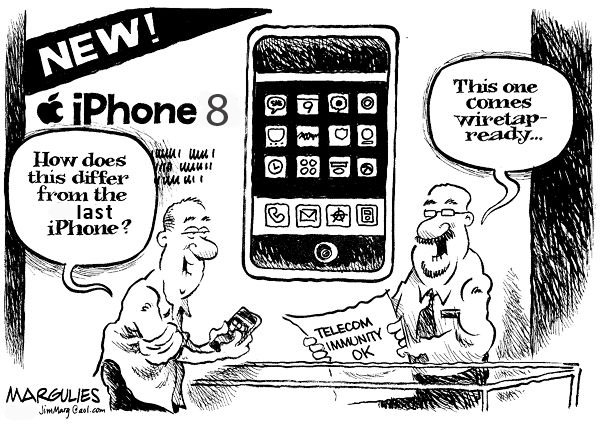 While taking a rest for a week to see how the world was developing without responding to it too eagerly every time, I admit I was gasping for air after last Sunday's Trump tweets. Without any visible proof Trump accused Obama for tapping "his" phones while insulting Obama viciously (and still has not stopped doing so with almost every tweet he blasts). It was not only embarrassing to see that happen but moreover it is starting to feel awkward and dangerous that a man who is obviously not smart enough to be a president of any country, is in charge of the most powerful one.
While taking a rest for a week to see how the world was developing without responding to it too eagerly every time, I admit I was gasping for air after last Sunday's Trump tweets. Without any visible proof Trump accused Obama for tapping "his" phones while insulting Obama viciously (and still has not stopped doing so with almost every tweet he blasts). It was not only embarrassing to see that happen but moreover it is starting to feel awkward and dangerous that a man who is obviously not smart enough to be a president of any country, is in charge of the most powerful one.
Trump obvioulsy does not seem to understand that even a president of the US is not in charge of everything and everyone and that in a democratic system there are "checks and balances" and a division of powers to avoid that a single man can do what Trump now obvioulsy seem to aim for. His phone tap rant on twitter, as a response to probably another Breitbart story he had read earlier, shows that he is unaware of or even simply does not accept the Trias Politica and the existing legal procedures of the US. He also does not seem to understand that this will most likely backfire in his own pocket, whatever the outcome is.
The Apprentice (The Reality Show President - Season 2)
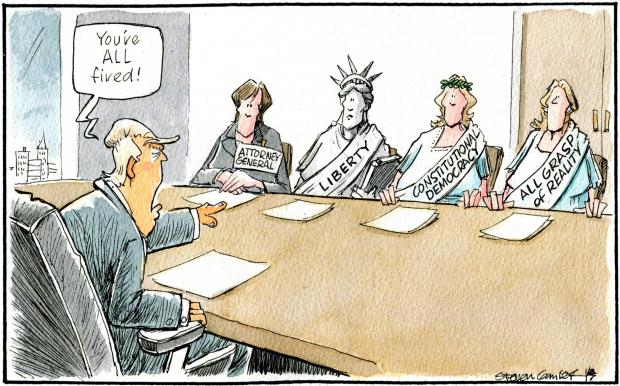 It's both amusing and terrifying to rewatch episodes of Trump's "The Apprentice" and see how that TV persona has shaped his presidencies. Remember how contestants were evaluated on communication, team building, and results, culminating in his trademark "You're fired!"? The irony is palpable when we look at his own performance in these areas.
It's both amusing and terrifying to rewatch episodes of Trump's "The Apprentice" and see how that TV persona has shaped his presidencies. Remember how contestants were evaluated on communication, team building, and results, culminating in his trademark "You're fired!"? The irony is palpable when we look at his own performance in these areas.
Communication? Trump has evolved from Twitter tantrums to Truth Social tirades. His thin skin hasn't thickened – every perceived slight still triggers a cascade of ALL-CAPS posts. His press conferences remain exercises in alternative reality, with each appearance more disconnected from facts than the last. Where once we had KellyAnne Conway and Sean Spicer twisting themselves into pretzels to defend him, now a rotating cast of spokespersons attempts to explain away his latest indictments, election interference claims, and increasingly erratic behavior.
Team building? His first term was a revolving door of resignations and firings. Now, after Biden's interlude, he's struggling to build a team for his second term. Many experienced Republicans are quietly declining positions, wary of associating with his brand of chaos. His promise to pursue "retribution" against political enemies has made recruitment even harder. The party that once grumbled about his leadership now faces a choice between complete submission or political exile.
And results? His first term gave us chaos, COVID mismanagement, and an insurrection. His campaign promises then – like now – were grand but hollow. The wall? Partially built and crumbling. Healthcare? No replacement for Obamacare materialized. Infrastructure? Biden actually delivered on that one, though Trump claims credit. His job creation announcements were often recycled news about previously planned investments, just as they are now.
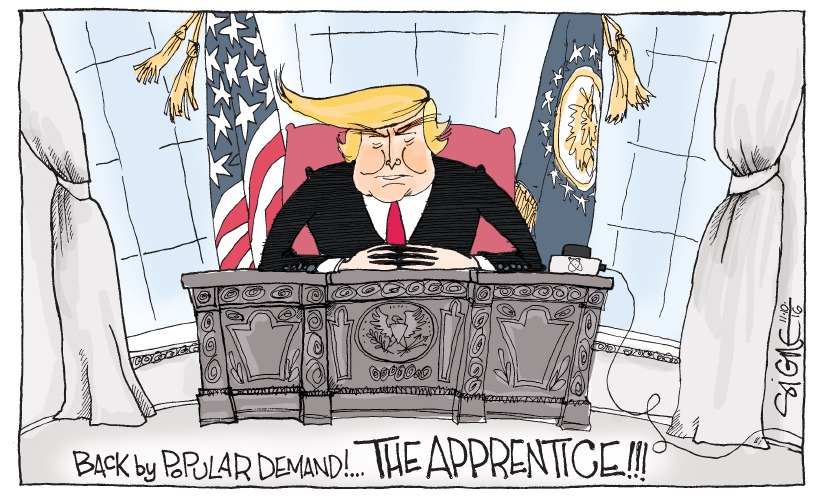 His current promises sound eerily familiar: another wall, more deportations, trade wars 2.0. He still doesn't grasp that presidential powers have limits – though he's made it clear he plans to test those limits further. His understanding of global technology and trade remains stuck in the 1980s, even as AI reshapes the economy and geopolitical alliances shift.
His current promises sound eerily familiar: another wall, more deportations, trade wars 2.0. He still doesn't grasp that presidential powers have limits – though he's made it clear he plans to test those limits further. His understanding of global technology and trade remains stuck in the 1980s, even as AI reshapes the economy and geopolitical alliances shift.
The tragic comedy continues with his base still believing in the reality show version of governance. They cheer for the spectacle while actual governance crumbles. Polls show his supporters still can't distinguish between political theater and real policy achievements – much like those who once couldn't tell the difference between the Affordable Care Act and Obamacare.
After four years of Biden attempting to restore normalcy, we're back to the reality show presidency. But this time, the stakes are even higher, and the script is darker. If America were still "The Apprentice," the host himself would have been fired long ago for incompetence. Instead, he's somehow gotten a second season.
YOU'RE REHIRED? (Heaven help us all.)
(big thanks to all the great cartoon artists in this article: Signe Wilkinson, David Horsey, Mike Thompson and Steven Camley)
Now what?
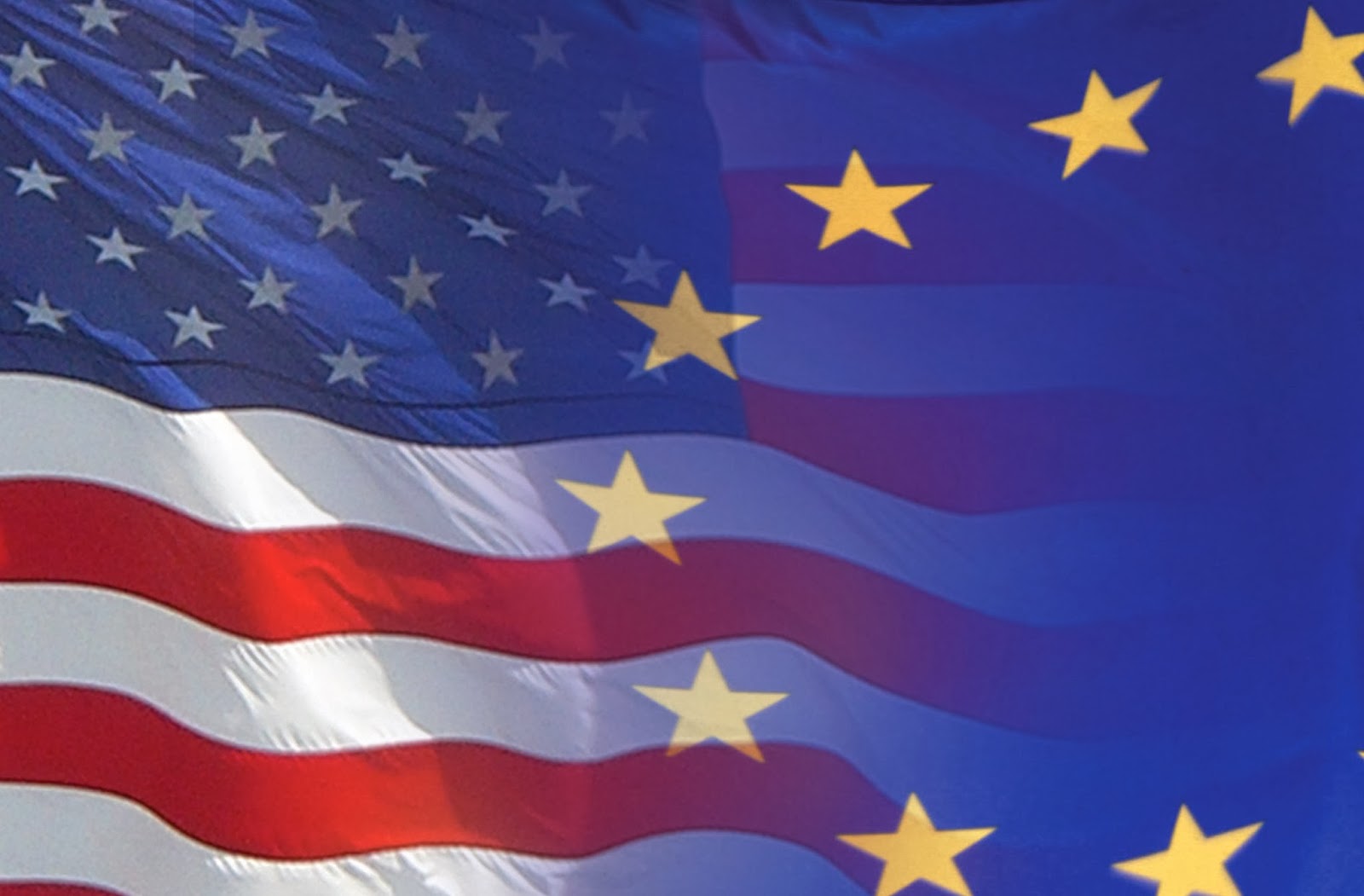 People ask me why I am so mad about Trump: "It's not even your country, it's far away, we have our own problems, do something about that!". Well that's exactly what I am doing. For decades my family and history lessons at school taught me about the Americans who saved us in WOII and are stil protecting us during the cold war and up until today. And for decades I took that for granted. Meanwhile the American dream came to me through TV, movies, music and stories from my friends and colleagues who crossed the ocean to find their personal luck, love and success. And I've even been there too for work and holidays a few times to sniff the air of that dream.
People ask me why I am so mad about Trump: "It's not even your country, it's far away, we have our own problems, do something about that!". Well that's exactly what I am doing. For decades my family and history lessons at school taught me about the Americans who saved us in WOII and are stil protecting us during the cold war and up until today. And for decades I took that for granted. Meanwhile the American dream came to me through TV, movies, music and stories from my friends and colleagues who crossed the ocean to find their personal luck, love and success. And I've even been there too for work and holidays a few times to sniff the air of that dream.
But somehow in the back of my mind there've been always some questions. Big decisions were made for us. In Europe we didn't have the "bombs" at least not in the quantity like the US and Russia so the cold war was mainly a fight between the US and the Soviets with Europe somewhere in between. The last decades or so big wars were started to "defend democracy" and protect us from terrorists. Yes, in Europe we also know democracy and we do have serious problems with terrorists. From everywhere. In the past from the IRA (Irish Republican Army), RAF (Rote Armee Fraktion in Germany), ETA (Euskadi Ta Askatasuna, armed Basque nationalists in Spain), quite a few more and recently Islamic fundamentalistic radicals too.
Nevertheless under guidance of the US (and the UK) and under the flags of the UN and NATO "we" have started or kludged a couple of huge wars like in Kuwait, Afghanistan, Iraq, Libya, Syria, Yemen and more. No real results (except Kuwait) are delivered, all the war zones are severely instabilized and Europe is suffering from a huge refugee problem as a consequence. Reliable figures are difficult to get but rough estimates say that somewhere between 250.000 and 500.000 people were killed in those wars due to "our efforts". City's, economies, families are completely ruined.
Meanwhile Crimea is taken by Russia again. A Malaysian aircraft with about 300 people was shot by the Russians out of the air above Ukraine. Israel, Turkey, Ukraine, Libia and quite a few countries in the neighborhood of European borders are still a complete mess. And on top of that, the economic downturn, by the way started in the US due to bad legislation in the fincance sector, brought populism in huge numbers. Le Pen in France, Wilders in the Netherlands, the FPÖ in Austria, Boris Johnson in the UK and more everywhere cause instability and protectionism with Brexit as an disastrous example. And with all the above examples in the heart of Europe, nothing is really done.
To me, Trump is just a caricature of the ultimate wrong direction. He says and does everything a sensible European leader or even any human being would or at least should never do. But he is there and even attracts "fans" in Europe with his clownesque behavior. Meanwhile he is the President of the United States, the self proclaimed "leader of the world". And that is just terrifying. Being mad at him is in fact being mad at myself having lived in a bubble of false stories. And I must admit, his strategy is satisfying. Create an enemy, condemn the past and get enough energy from that to tell your own stories. I can only hope my facts are more accurate.
I believe it's time that Europe unites again. The French have "liberté, égalité, fraternité" as their motto and in the heart and constitution of every European country and their people something similar is close by. It's time that we break free of our "big brother": the US. Not that we should run to Russia, on the contrary, but given our long common European history we do have lots of experience collaborating with the far east countries like China, Japan, India and Indonesia and some more in Africa too.
Lets enjoy the turmoil coming from the US (they have some real good comic shows every night :)) and lets take them as an example how we shouldn't create our world. Hopefully common sense will emerge there soon and maybe we can than reboot cooperation between Europe and the US again too. But for the time being, no, we should build to our own strength.
Meanwhile in a few months elections in France, Germany and the Netherlands will set the pace. Fast forwards to a brave new world with promises of prosperity for everyone due to reliable collaboration between all European countries and their partners. Or backwards towards a tired and frightened society with every country on its own.
Vote!
Page 5 of 6
